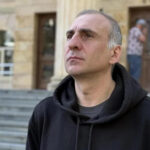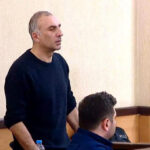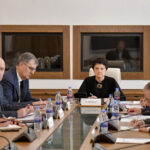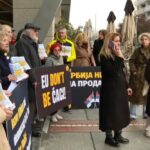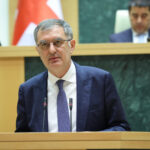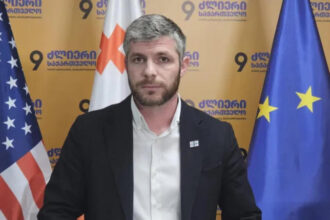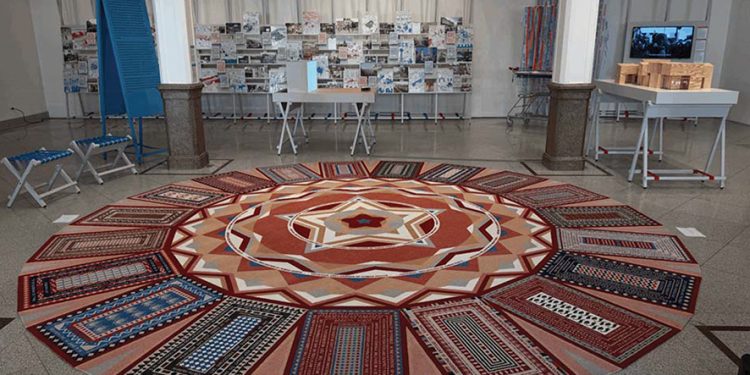In today’s hypercommodified landscape words like “community,” sharing,” and “solidarity,” have been coopted, becoming buzzwords within the lexicon platform capitalism. Social media companies thrive off the idea of community, while destroying its very essence by commodification. An Atlas of Commoning : Places of Collective Production is a response to this crisis. The exhibition, which is hosted at the TBC Concept Flagship, in collaboration with Tbilisi Architecture Biennial aims to reclaim language and practices associated with community, encouraging viewers to reconsider the meaning of “we”.
The exhibition’s core critique is the loss of community values by focusing on the dynamic and messy process of creating and maintaining shared resources and spaces. This practice is in direct opposition to privatization and individualism, which are rampant in urbanization today. This is a call to revive collective governance and rediscover public life. This is especially relevant in a city such as Tbilisi where rapid urbanization has reshaped physical and social landscapes.
From the Global to Local: The Atlas as a Living Archive
Atlas of Commoning is a central feature of the exhibition. It is constantly evolving. The Atlas of Commoning, originally conceived by ARCH+ & Carnegie Mellon University is an open archive that documents grassroots projects around the world that challenge the privatization urban spaces. As the exhibition moves from city to city, local case studies will be added, keeping the Atlas constantly in flux.
Students from the Free University of Tbilisi conducted local research in Tbilisi under the guidance of CMU faculty. This ensured that the Atlas reflected the unique struggles and solutions of the city. The result is a living document, not just a collection case studies. It’s a global commons that grows with each iteration of this exhibition.
The Atlas of Tbilisi connects to the city’s turbulent history of urban development. Privatization boom after the collapse of Soviet Union led to erosion of public space and rise in stark economic inequality. The exhibition reveals how local activists and groups are now pushing against the system, reclaiming the space and reinventing the meaning of living together in a modern city.
Reimagining Production & Reproduction: New Forms Of Spatial Organization
The exhibition’s focus on the merging of production and reproduction is particularly striking. These terms have been separated for a long time, both spatially and socially. Historically, labor has been relegated to economic production, while reproduction–childcare, household work, and caregiving–has been considered secondary. This separation has not just reinforced gender hierarchies but also limited the possibility for new, inclusive forms of collective life.
The exhibition highlights initiatives which challenge these divisions. Granby Workshop, a project in Liverpool, shows how residents can take back control of their neighborhood’s destiny. The Granby community transformed its urban environment through collaboration with the architecture collective Assemble. They created a social enterprise which produces ceramics using local waste. The workshop blurs production and reproduction lines, offering a model for communal life that benefits all involved.
This theme of reclaiming private and public spaces has a special resonance for Georgian viewers. The rapid urbanization that swept through Tbilisi after the 1990s has pushed many communal activities–traditionally integrated into public life–out of shared spaces. An Atlas of Commoning presents global and local case-studies to invite visitors to imagine what similar efforts could look like in their own neighborhood.
Who Owns The City? The Battle over Space, Ownership, and Access
Many of these initiatives are centered around a fundamental question: who owns the city. This question is more important than ever as urban environments around the world become commodified and land and housing are increasingly out of reach for many. An Atlas of Commoning addresses this issue directly, presenting alternative ownership models which challenge the capitalist system’s grip on urban space.
This spirit of resistance is exemplified by the Free Universal Construction Kit, an exhibit created by Golan Levin & Shawn Sims. The kit is made up of 3D-printed connectors that allow construction toys such as Lego and Duplo to be used together. The kit questions ownership of creativity and intellectual properties by allowing the combination of toys that are normally separated by proprietary systems.
In Tbilisi the rapid gentrification and privatization of urban space has created heated debates about who controls the city. The exhibition’s explorations of these issues are relevant today, and encourage citizens to think critically about the ways in which urban land can be shared more equitably. The lessons of this exhibition are vital for the emergence of grassroots movements in Tbilisi, such as those that preserve the historic neighborhoods of Sololaki or Abanotubani.
Beyond Borders: Commoning is a form of global solidarity
An Atlas of Commoning’s final section focuses on the intersection of legal rights with global solidarity. It challenges the often limited scope of human rights that are rooted in national boundaries and state sovereignty. Commoning practices offer a form governance and resource sharing which transcends legal frameworks and opens new paths for international collaboration and mutual aid.
Manuel Herz’s Rights on Carpet is a notable object in this area. The carpet is adorned with declarations of rights for humans and invites visitors engage with them in a visceral manner by sitting, kneeling or lying down. It highlights the ongoing struggle for these rights to be realized in real life rather than treating them as abstract legal concepts. In Georgia, where minorities’ rights and displacements are major issues, the idea of solidarity beyond borders resonates strongly.
Commoning as a revolutionary practice: A blueprint for the future
An Atlas of Commoning is powerful because it insists on commoning being a process, not a state. The exhibition does not present commoning as a utopian, idealized vision, but rather as a messy and ongoing negotiation between individuals. communities, and power systems. It is a practice that is rooted in the belief collective governance, shared resource, and solidarity are tools we need to create an equitable and just world.
This exhibition provides a blueprint of action for Tbilisi and cities around the world. The exhibition provides a roadmap to resisting privatization and commodification of urban life by focusing on how commoning is done – how resources are shared, spaces are governed, and how communities are organized.
An Atlas of Commoning is a timely reminder of collective action as cities face increasing pressures from globalization and climate change. Reclaiming the spaces and materials that have been lost due to commodification allows us to reclaim our rights to live, work and build together, putting people before profit.
By Ivan Nechaev
Read More @ georgiatoday.ge



